My 200-mile Welsh adventure left me crying in a convenience store - but I'd do it again
Looking for a challenging two-day tour, Steve Shrubsall heads to the wild Pembrokeshire coast of Wales (UK) – and gets exactly what he wished for…
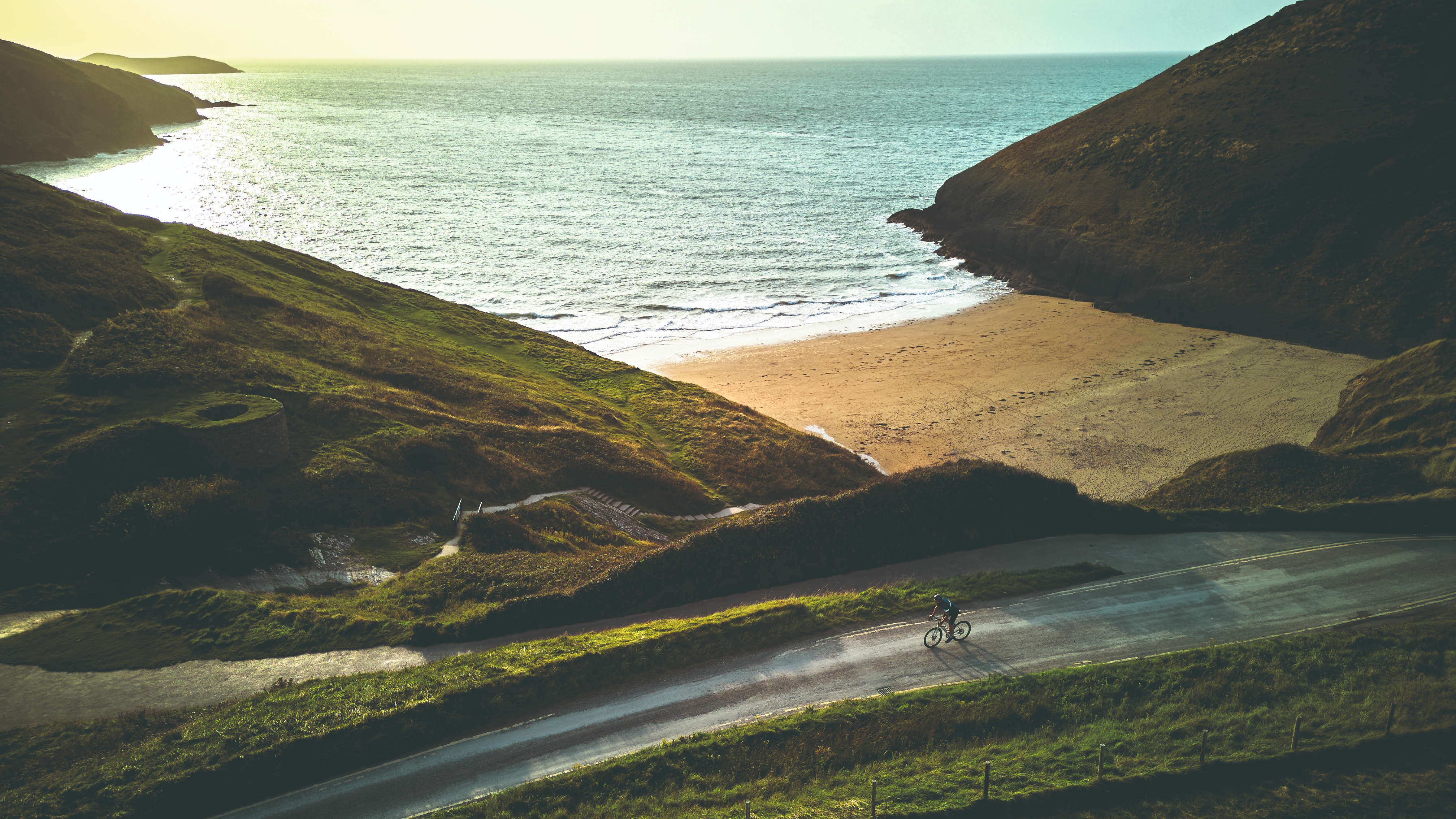
Well, this wasn’t in the brochure. It was day two of my cycle tour of the Wales' (UK) Pembrokeshire coastline and I’d erred somewhat from the itinerary. I was standing in a Nisa Local convenience store in St Clears, a small town in Carmarthen, South Wales. Outside, a howling wind tore rampantly through the high street while rain thrashed out a ferocious pattern on the shop window. Inside, I had become the focal point of much intrigue. Drenched and dirty, I looked like I’d just been dredged up from the bottom of the Bristol Channel (midlands, UK). And I was as hungry as a half-starved Bull Mastiff.
Having negotiated some 100 miles in monsoon conditions, I’d all but cleared out my glycogen stores, and my energy levels had ebbed, flowed and ebbed again. I was weak, so very, very weak. And lastly, but definitely not least on this little list of woe, as things stood I didn’t have a red cent to my name. The rain, you see, as well as having soaked me through to my internal organs, had been so heavy that it had infiltrated the little plastic bag I keep my phone in and essentially marinated it. Wet, cold, hungry and with no means of payment, I threw myself at the mercy of the good people of St Clears and begged for their charity.
“You should have done your ride yesterday,” a genial gent in the queue piped up, “the weather was beautiful.” I forced a smile. Yesterday, I thought, removing my helmet and glasses, all my troubles did indeed seem so very far away. Yesterday, my tour began in a place called Mwnt (pronounced ‘moont’), a few clicks north of the wonderful little coastal town of Cardigan. The late afternoon sun had highlighted the crags and coves of the rugged Welsh coastline. Flashes of white limestone and brilliant yellow sand traced the shore while a cobalt blue sea played languidly beside it. It was picture-postcard stuff, exactly what I’d hoped for. Although it can hardly be described as uncharted territory, the Pembrokeshire coast held a mystique for me. Everyone knows it’s soaking up the scenery while ticking off the allotted daily mileage.
Curry carb load
Everything started off according to plan: the weather was glorious, the roads smooth and the views phenomenal. Chattering goldfinch foraged in hedgerows beside me while the last swallows of the season bobbed and weaved, scouting out a final feed in Welsh airspace before setting off on their 6,000-mile schlep back to South Africa – a tour to put mine to shame. My first feed stop was in Cardigan rather than Cape Town. The touring cyclist should always make plans to stop for elevenses, lunch and afternoon tea, and each of these sittings should comprise at least one piece of cake alongside a cup of coffee so strong it could make a sloth break out into a Riverdance. Obeying the rules, I sat outside a quaint little cafe watching life unfold at the mouth of the River Teifi. A little further down the river, a large moored boat caught my eye because people seemed to be queuing to get on board. I paid for my coffee and slung a leg over the Canyon Endurace I’d assigned to the tour. But before I’d rolled 20 metres, my phone rang. It was Butch, CW’s photographer. “I’ve just found a massive boat,” I told him, “and get this, there’s an Indian restaurant on it.”
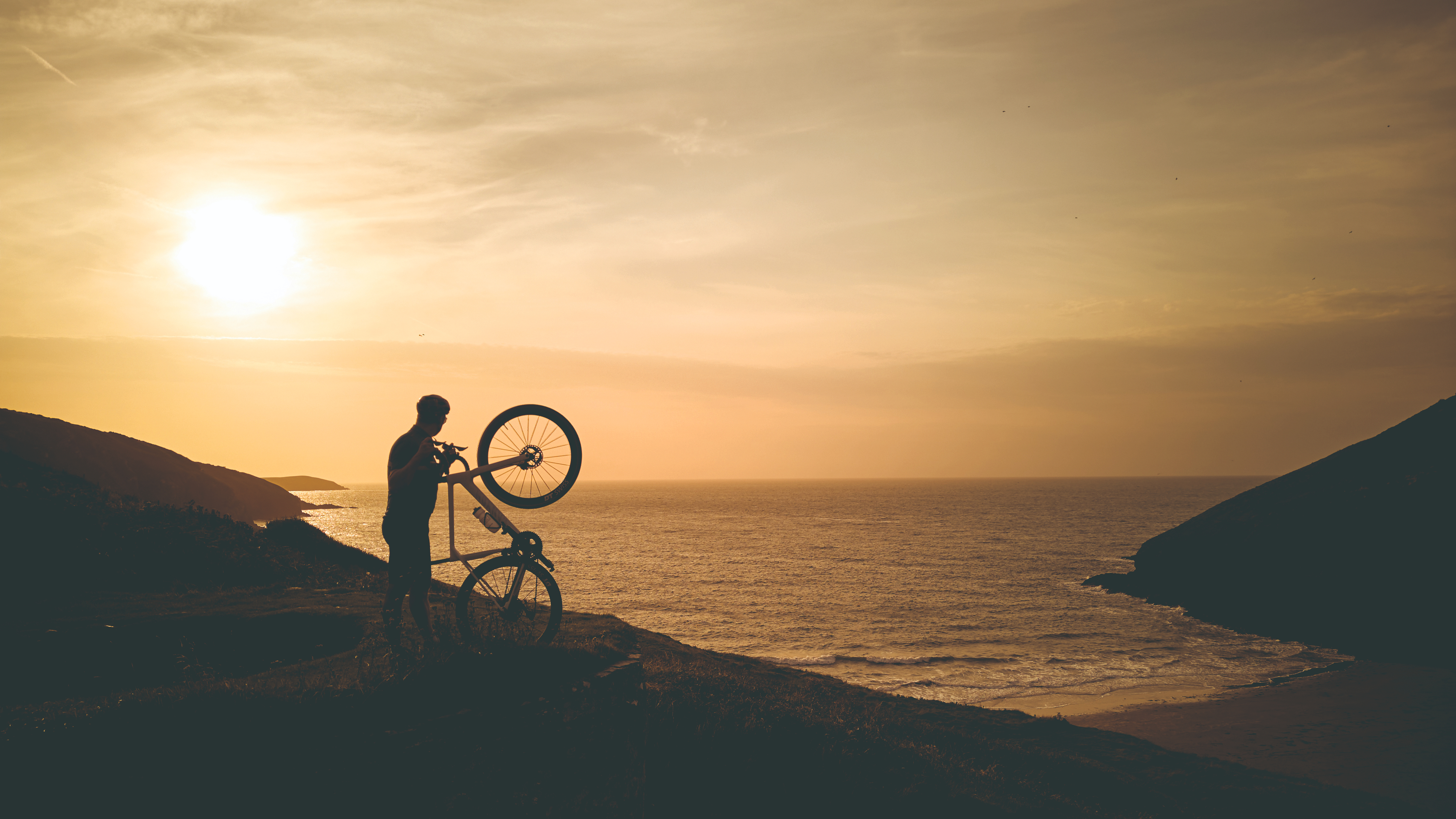
A golden moment as day breaks over Mwnt and the journey begins
I popped in and booked a table for 8pm, giving us time to explore the coastal stretch south of Cardigan. Poppit Sands is a sheltered cove where surfers and body borders speckle beautiful around here – it has National Park status, after all – but it was the challenging nature of the terrain, the wildness of the place and its capricious weather, that drew me in.
The plan was to cover almost 200 miles over two days of riding, which, in retrospect, was maybe a little ambitious given the 4,600m of vertical ascent involved. I’d looked ahead to early September optimistically, foreseeing days still relatively long and weather still fair, with no problems riding at a sedate touring pace, the shoreline and fisherfolk prop up the sandbanks in hope of landing a salmon or sea trout as they run down toward the River Teifi. Nearby Strumble Head just north of Fishguard is a haven for wildlife lovers: bottlenose dolphins, basking sharks and seals can be spotted in the water, while Manx shearwaters and puffins congregate on the cliff faces. A true Welsh safari. Who needs the Okavango Delta when you’ve got Pembrokeshire, especially when it’s home to a curry emporium situated on a boat.
"The plan was to cover almost 200 miles over two days of riding"
That evening, Butch and I took our seats. Given today’s lackadaisical approach to the tour, tomorrow we’d be in for the long haul – about 130 miles of riding with some 3,000m of vertical ascent. Taking no chances on my carb-load, I went belt and braces: five poppadoms, a keema naan, pilau rice, a sag aloo and, controversially perhaps, a lamb vindaloo. All washed down with a brace of Cobra beers. I waddled off the boat 3,000kcal heavier, confident the tanks were full. Tomorrow’s going to be a doddle, I thought, slowly drifting off to sleep beneath an oniony fug.
Get The Leadout Newsletter
The latest race content, interviews, features, reviews and expert buying guides, direct to your inbox!
In the morning, it was obvious from the outset that the imminent problem was not going to be fuelling. I didn’t have to draw the curtains to check the weather because it woke me up. A shrieking 25mph southwesterly – exactly my direction of travel – served as a very effective alarm call. Still, at least it wasn’t raining. Yet. To say the ride from Cardigan to St Davids was slow going would be to engage in wild understatement. I was pedalling downhill at over 400 watts and barely breaching single digits on the speedometer. I’d wanted a challenge, yes, but I didn’t want to get blown back to the early 1970s. This was soul-destroying.
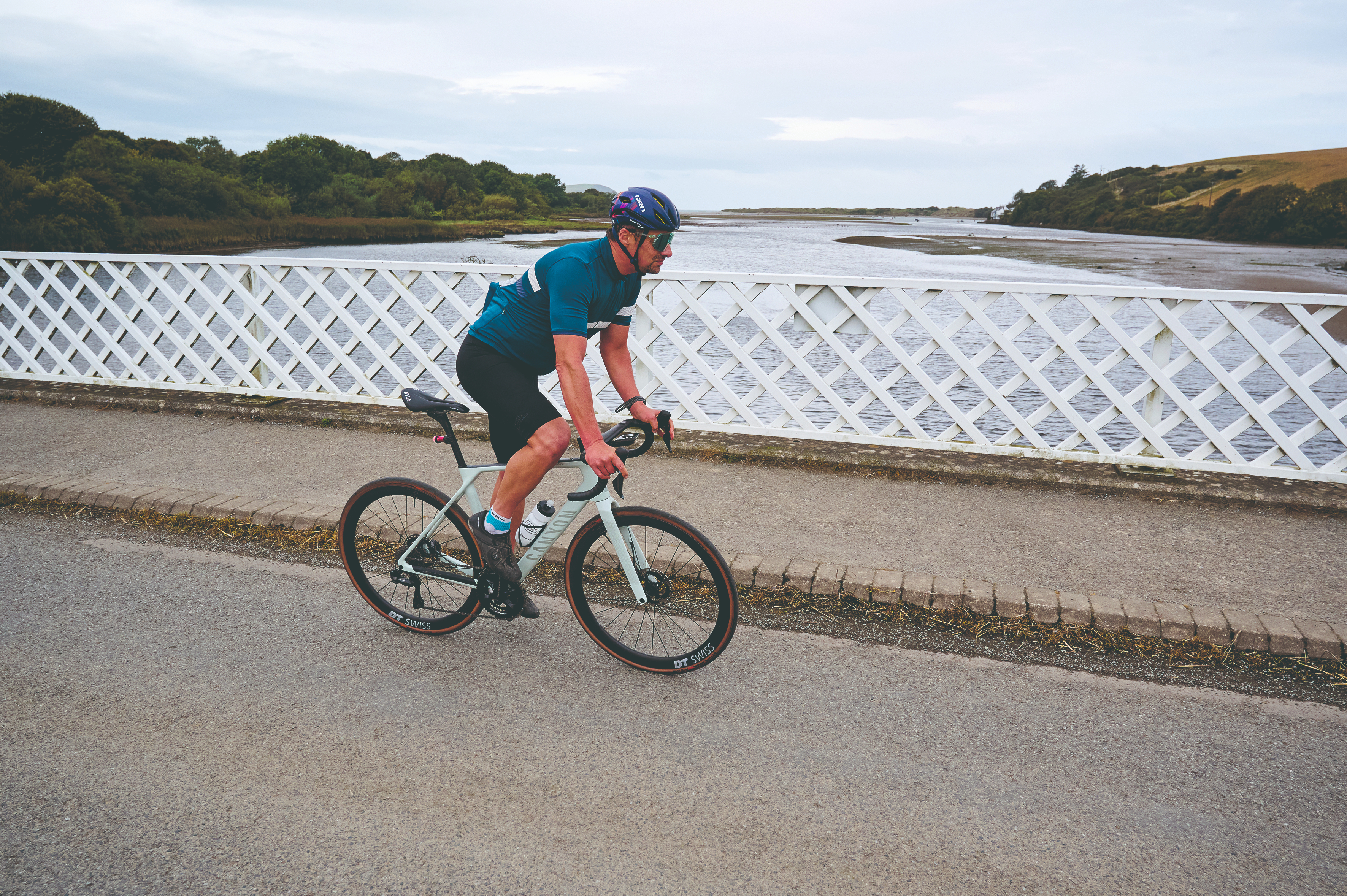
“Wind assistance, curry or both?”
There was light at the end of the tunnel, however, as I’d only have to endure 40 miles of this until a change of direction at St Davids would see me set sail on a wind-assisted eastward tack. St Davids is more than just a turning point; it’s the smallest city in Britain. Nestled inconspicuously in Wales’s wild west, it’s home to St Davids Cathedral, which boasts another superlative: it’s Britain’s oldest. With the cathedral settlement having been established in the sixth century, it is one of the most important medieval sites in Christendom. A birdwatching couple I’d spoken to a few miles to the north of the city noted that, although they were in no way religious, St Davids had a unique kind of celestial aura. Sitting on the pavement outside Budgens eating a jumbo sausage roll, I had to agree.
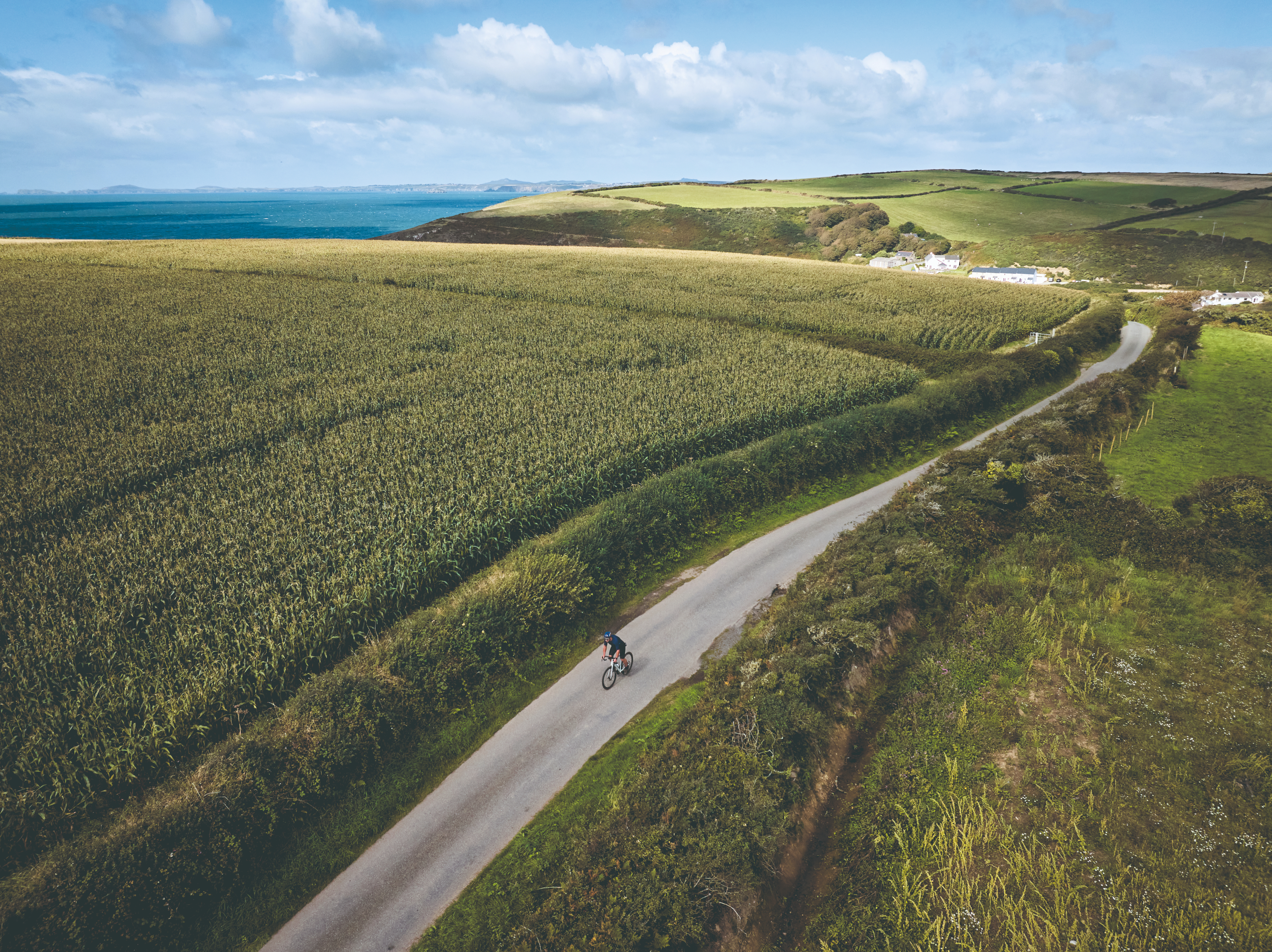
Out of the wind at last, with just a touch of drizzle, nothing to worry about...
The wind was now at my back, so the next 90 miles promised to be an ethereal few hours. I put a small bag of groceries in the van with Butch and we made plans to rendezvous some 20 miles along the coast in Broadhaven. Little did I know, I would not see my photographer colleague for another eight hours. Things, you see, were about to go desperately pear-shaped. On the outskirts of St Davids, a fine powdery drizzle began to fill the air. By the time I reached Solva, drizzle had become steady rain, which as I passed through Newgale, became torrential. This was no passing deluge; it was set in. Reflecting on the fact I’d come to Wales for a physically taxing tour, I made a note to be careful what I wished for in future. I’d need gills and a dorsal fin to get through this. Within minutes, as a continuous dark cloud spilled in from the west, I’d forgotten what it felt like to be dry. Yes, I had a tailwind now but it was scant consolation.
Tears of relief
Now where’s that photographer of mine? I’d arrived at our meeting point and he was nowhere to be seen. Several hours on the bike already today had burnt off the previous evening’s Indian banquet and my body needed more fuel. If I wanted to arrive at the tour’s final destination, The Mumbles, before darkness fell, I’d need a large dose or carbs – and soon. I checked my phone for Butch’s location and was crushed to find that, even after a desperate volley of thumps and a tirade of hissed expletives, the damn thing would not acknowledge me. It was drenched, broken, dead – and Butch was nowhere to be seen. Our paths must’ve crossed at some stage but visibility was currently about 7cm; we were ships in the night.
After a further 50 miles, passing through Haverfordwest and Nabeth, I started to feel very unusual. Although I had very little energy, climbing had off ered temporary respite from the cold. Descending, on the other hand, was an extremely distressing aff air. I couldn’t summon the requisite movement to generate any warmth at all. So when a sign for St Clears materialised through the throes of a particularly rambunctious squall, I found myself with no other option than to stray from my Garmin’s route instructions, head into the town and – let’s not beat around the bush here – beg for food.
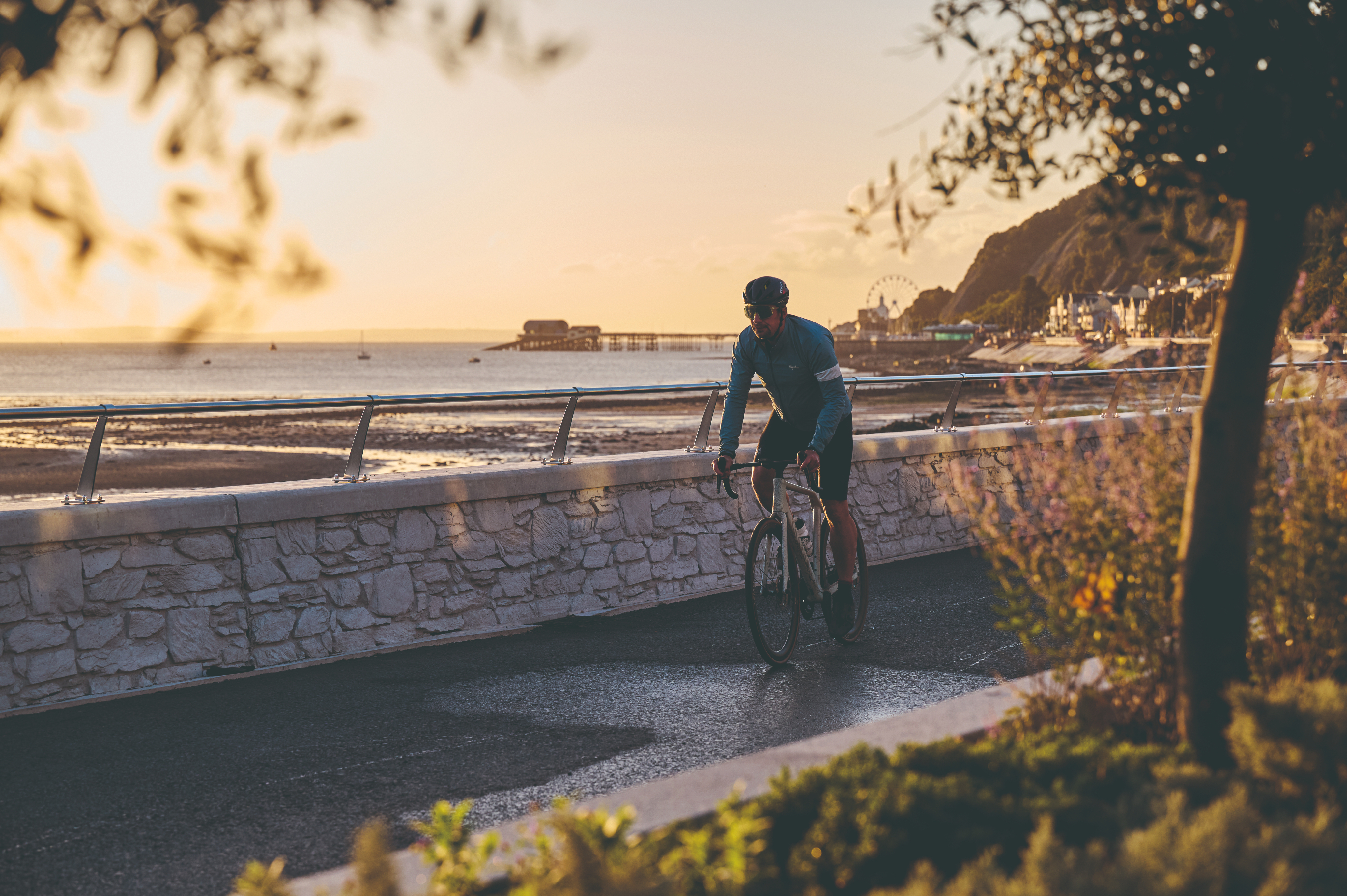
"I found myself with no other option than to beg for food"
It was here that the genial gent in the shop queue suggested I’d have been better off riding yesterday. Thanks, mate. Harrowingly aware that I had no means of payment, I took off my glasses and helmet, approached a senior member of staff and began the pitch I’d been working on in my head for the last two hours: “These glasses, I told her, are worth somewhere in the region of £250 – but they could be hers for as little as one Meal Deal.” She looked at me nonplussed – as did everyone else in the shop. But then something amazing happened: my desperation elicited the true spirit of Welsh hospitality and kindness. “I’ll buy you a coffee,” said a woman just about to leave. “Oh, here’s 20 quid,” said another gent handing me over a crisp bank note. “Just pop it back in if you’re passing through.” I was moved to the point of tears.
So, there I was, halfway through a late-summer bicycle tour, weeping in a Nisa convenience store. To the people of St Clears, a small town in Carmarthen, South Wales, I say thank you, thank you, thank you. Still wet but now in possession of £20’s worth of fast-release carbs, I continued onto The Mumbles. En route it became apparent that the cordial nature of the people of South Wales wasn’t exclusive to St Clears. Earlier, in a moment of rain-sodden madness, I’d instructed my cycling computer to calculate the quickest course to the end of this blessed tour – coastline be damned. This meant missing out Tenby and The Gower Peninsula, two places I’d always wanted to visit. The fastest possible route to The Mumbles was largely made up of busy A and B roads – yet it wasn’t the white knuckle run-in to the finish it could have been.
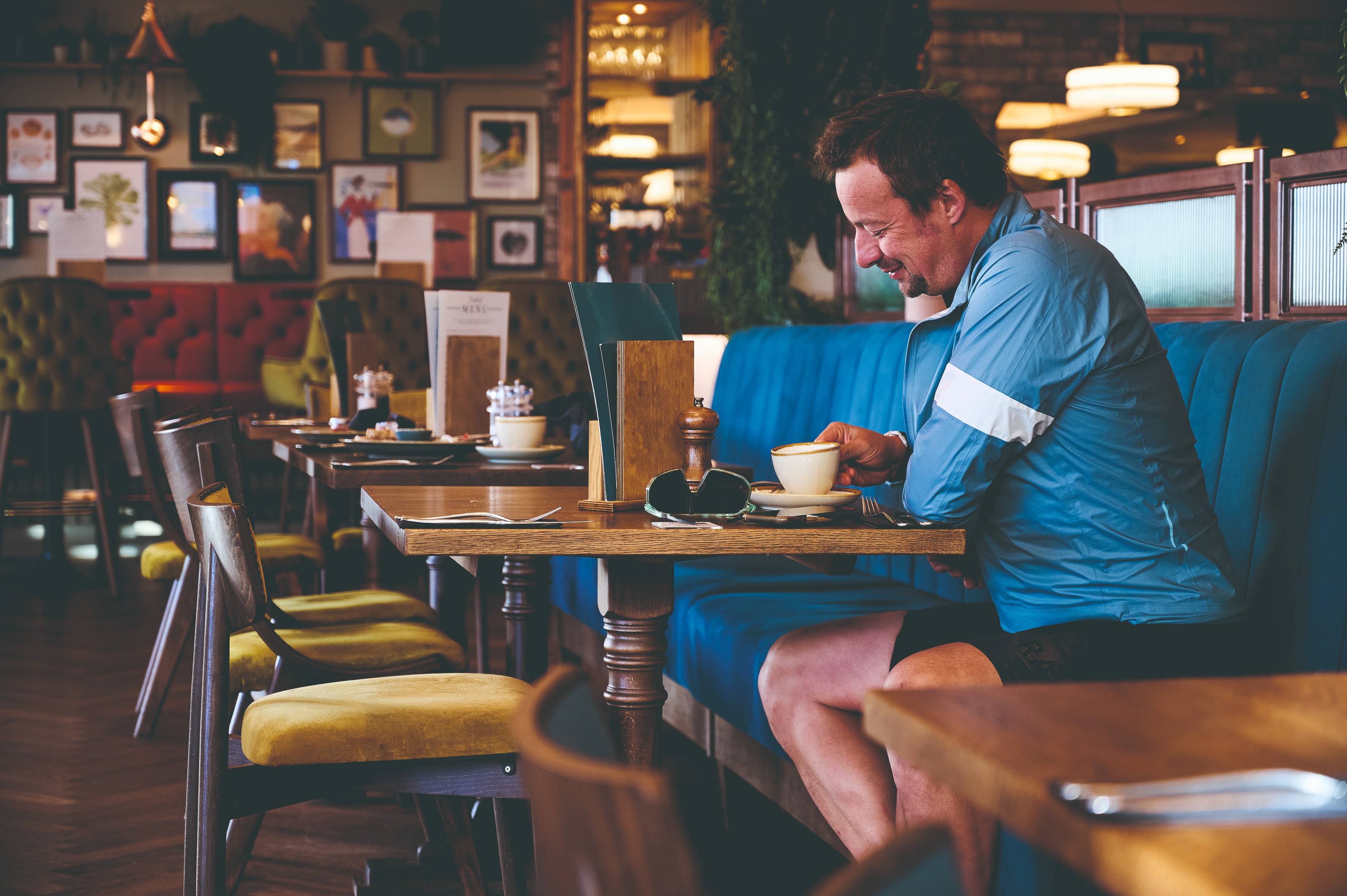
Ample coffee stops were non-negotiable
Traversing a hilly ribbon of smooth blacktop between Camarthen and Lllaneli, I was stunned at how patient the drivers were, most of them offering a cursory flick of the hazard lights or a quick beep of acknowledgement. In southern England's Surrey I would likely have been met with a series of close passes and a flurry of expletives. It was different here. People were in less of a hurry. Yet my southeastern sensibilities remained and I kicked hard for the fi nish, keen to get to the hotel and out of the rain.
I arrived at our accommodation just as the sky turned from ashen grey to pitch black. Butch was waiting for me, palpably relieved to see I was still alive. “Where have you been?”
“I’ve been crying in St Clears, if you must know. How about you?”
“Well, aside from spending the last five hours driving around South Wales looking for you, I’ve managed to find a place for dinner.” He gestured towards a cosy hostelry overlooking the bay. It looked like the sort of place that sold cheeseburgers and lager.
“Wales never fails,” I replied. “Wales never fails.”
Key information
Where to stay
Cardigan: The Albion Aberteifi (from £205/night) sits on the bank of the River Teifi . The rooms are immaculate, the beds comfortable and the central location perfect for exploring the rest of Cardigan, a terrifi c little coastal town.
The Mumbles: Oyster House (from £80/ night) overlooks Swansea Bay. Best of all, the baths are huge, perfect to soak in after a hard day in the Welsh hills.
Where to eat
The Shampan in Cardigan is situated on a moored boat on the River Teifi and dishes up hearty bowls of Indian fare. Go hard on the rice and naan breads for a carb-heavy pre-ride feast: shampan-cardigan.co.uk
The Oyster House in The Mumbles boasts ‘the best roast in town’. Unfortunately we didn’t turn up on a Sunday but the large breakfast set a very high bar: oysterhousemumbles.com
What to see
Largely a coastal route, this is a tour teeming with wildlife-spotting potential. Orcas, dolphins, puffi ns and turtles can all be spotted on the length of coastline between Cardigan and St Davids. St Davids itself is worthy of a pilgrimage, and the whole Pembrokeshire coastline is wild and wonderful in equal measure.

Thank you for reading 20 articles this month* Join now for unlimited access
Enjoy your first month for just £1 / $1 / €1
*Read 5 free articles per month without a subscription

Join now for unlimited access
Try first month for just £1 / $1 / €1
Steve has been writing (mainly fitness features) for Cycling Weekly for 11 years. His current riding inclination is to go long on gravel bikes... which melds nicely with a love of carbs
-
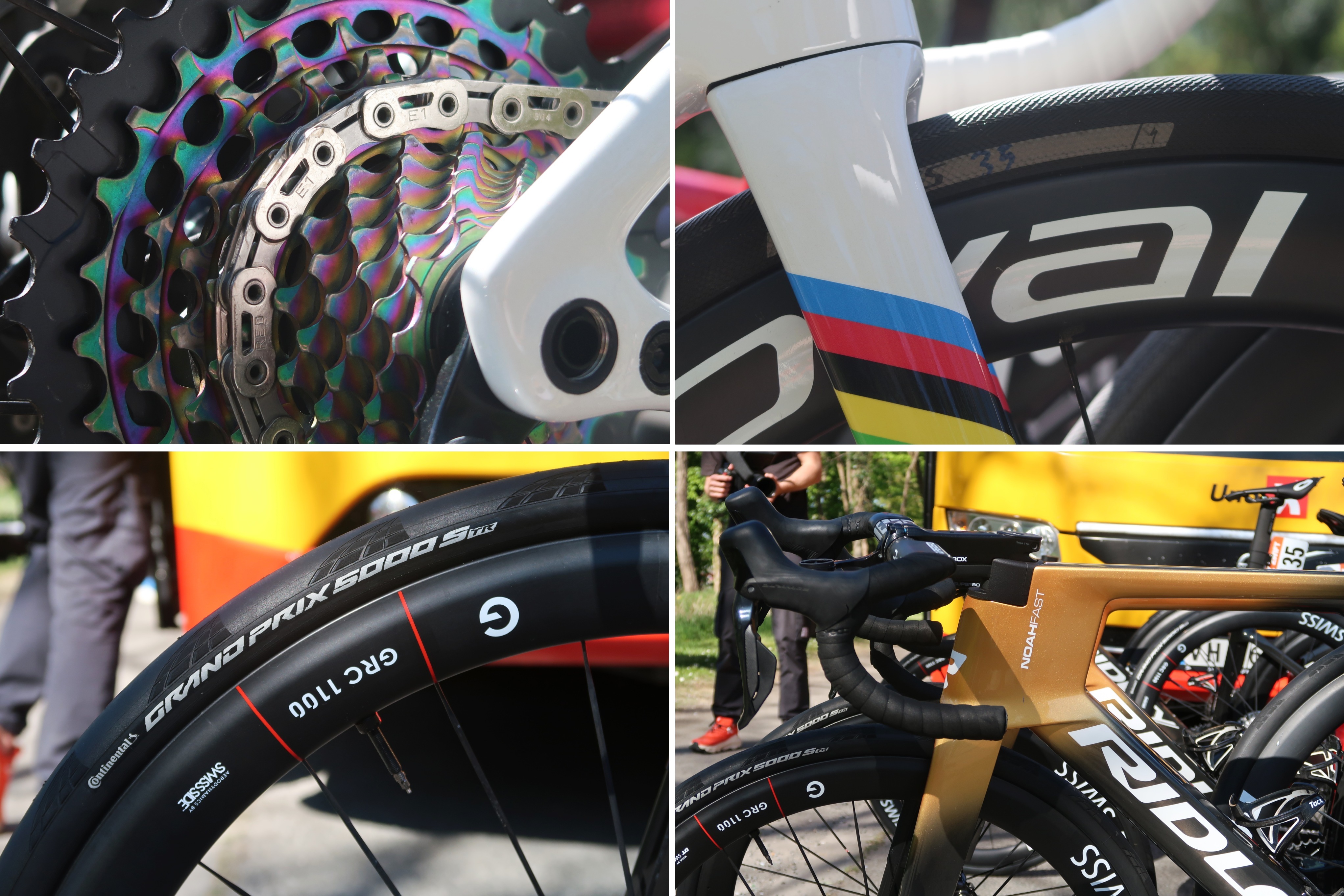 Aero bikes with gravel wheels?: Six tech insights from Paris-Roubaix Femmes
Aero bikes with gravel wheels?: Six tech insights from Paris-Roubaix FemmesEverything we found out about tyre widths, self-inflating systems, and wheel choices from the cobbled Monument
By Tom Davidson Published
-
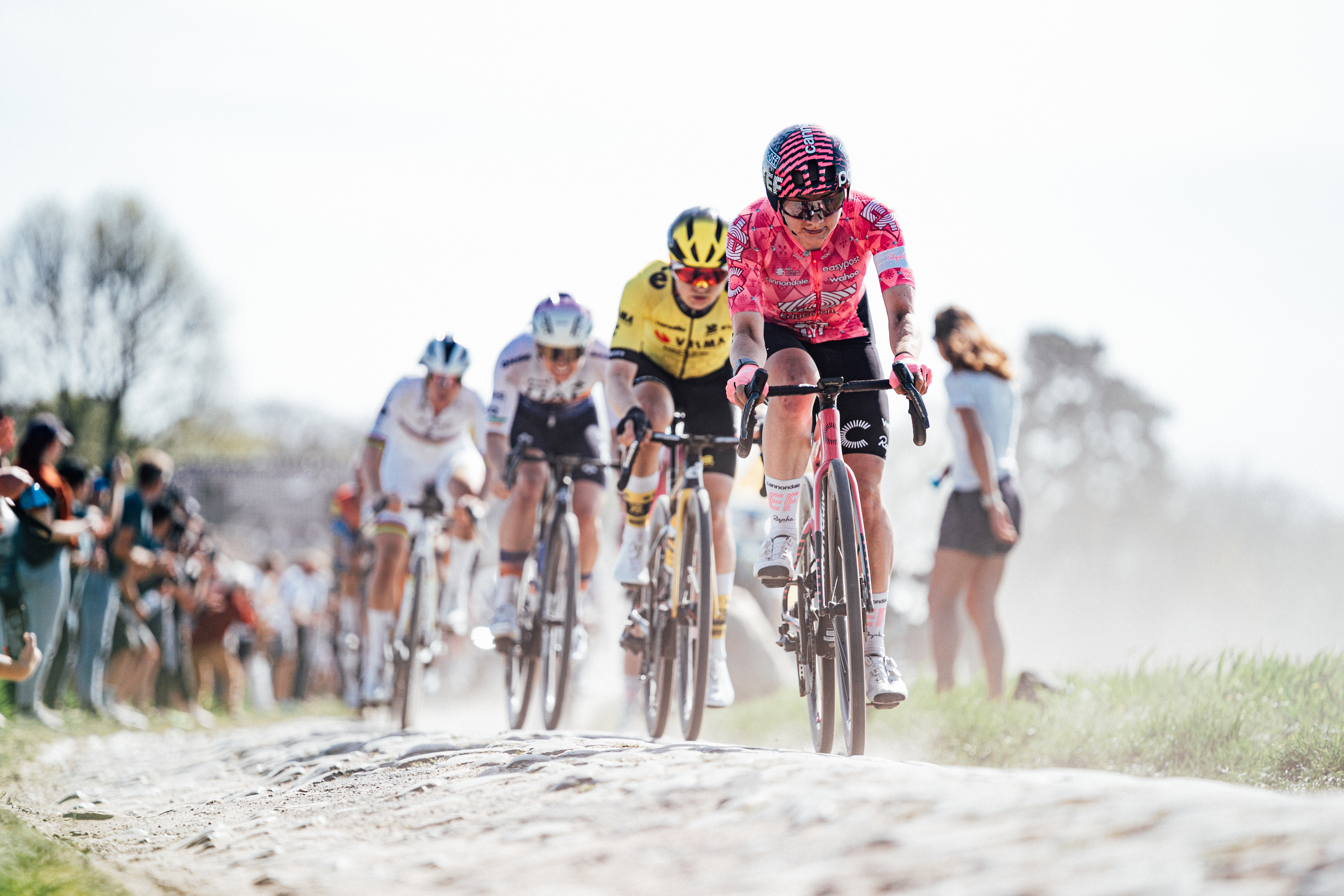 'This race is absolutely disgusting': Peloton reacts to another brutal Paris-Roubaix Femmes
'This race is absolutely disgusting': Peloton reacts to another brutal Paris-Roubaix FemmesNow in its fifth edition, Paris-Roubaix Femmes is still a tough race, even for the best bike riders in the world
By Adam Becket Published